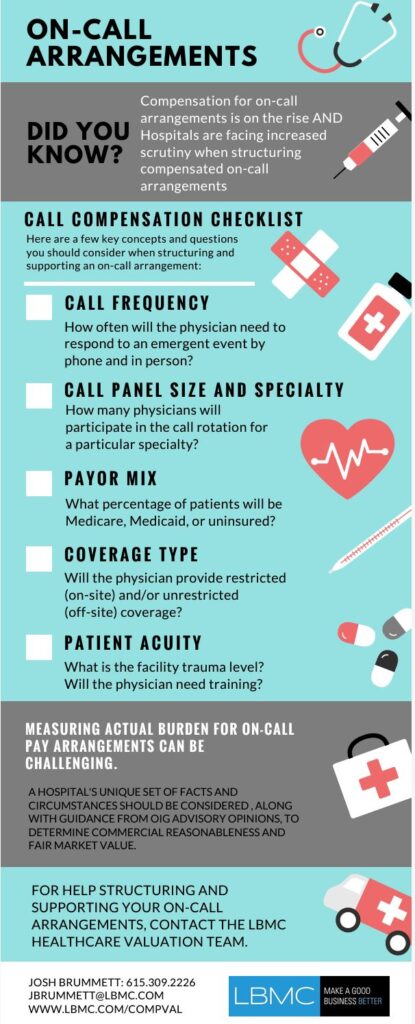Call coverage arrangements in the healthcare industry have become increasingly crucial as they directly impact patient care, physician satisfaction, hospital finances, and regulatory compliance. In this blog post, we delve into why these considerations hold such significance and why hospitals and healthcare facilities must pay careful attention when structuring compensated on-call arrangements.
Call Compensation Checklist
Here are a few key concepts and questions to consider when structuring and supporting an on-call arrangement:
- Call Frequency: How often will the physician respond to an emergent event by phone and in person?
- Call Panel Size and Specialty: How many physicians will participate in the call rotation for a particular specialty?
- Payor Mix: What % of patients will be Medicare, Medicaid or Uninsured?
- Coverage Type: Will the physician provide unrestricted (off-site) and/or restricted (on-site) coverage?
- Patient Acuity: What is the Facility’s Trauma designation and will the physician need advanced training?
- Provider Type: Is the physician providing coverage employed or an independent contractor?
The Importance of Considerations in Structuring On-Call Arrangements
1. Patient Care and Safety
The core purpose of on-call arrangements is to ensure continuous and prompt medical care for patients in emergent situations. The frequency with which a physician responds to urgent events, both over the phone and in person, can significantly impact patient outcomes. The availability of experienced physicians during critical moments can make the difference between life and death. Hospitals must strike a balance between physician availability and avoiding burnout, ensuring that patients receive timely and high-quality care.
2. Regulatory Scrutiny
The rise in compensation for on-call arrangements has attracted the attention of regulatory bodies like the Office of Inspector General (OIG) in the United States. Hospitals that do not establish their on-call arrangements with appropriate guidelines and compensation structures can potentially run afoul of anti-kickback and Stark regulations. This can lead to legal challenges, financial penalties, and damage to the hospital’s reputation.
3. Physician Engagement and Satisfaction
On-call arrangements can have a direct impact on physician engagement and job satisfaction. Physicians who feel fairly compensated for their on-call duties are more likely to participate actively and positively in these arrangements. Conversely, if compensation is inadequate or the burden is too heavy, physicians might become disengaged or even refuse to participate, potentially leading to a shortage of available on-call providers.
4. Financial Implications
The financial implications of on-call arrangements are significant for both hospitals and physicians. Hospitals need to balance the cost of compensating physicians for on-call duties against the potential revenue generated by increased patient volume. At the same time, physicians need to ensure that the compensation they receive fairly reflects the level of responsibility and time commitment involved in being on-call.
5. Specialty Expertise and Patient Acuity
The size of the call panel and the specific specialties represented can impact the quality of care delivered. Ensuring that the right specialists are available on-call is vital, especially for facilities with specific trauma designations. The level of patient acuity and the need for advanced training or specific expertise further underline the necessity of carefully selecting on-call physicians.
6. Compliance with Fair Market Value
As regulatory scrutiny intensifies, hospitals must establish on-call compensation that aligns with fair market value and commercial reasonableness. The inclusion of guidance from OIG Advisory Opinions and industry benchmarks is essential to ensure compliance with legal and ethical standards.
The considerations surrounding on-call arrangements in healthcare extend far beyond compensation. They touch upon patient care, regulatory compliance, physician engagement, financial sustainability, and specialized expertise. Hospitals and healthcare facilities must meticulously structure their on-call arrangements by factoring in all these aspects to provide optimal care, maintain compliance, and foster positive physician relationships.
For expert assistance in developing and supporting these arrangements, the LBMC Healthcare Valuation Team stands ready to help. By addressing these considerations, healthcare institutions can navigate the complex landscape of on-call arrangements successfully.
Content provided by LBMC’s Josh Brummett, Shareholder in the Healthcare Valuation division of LBMC, PC in Nashville.


